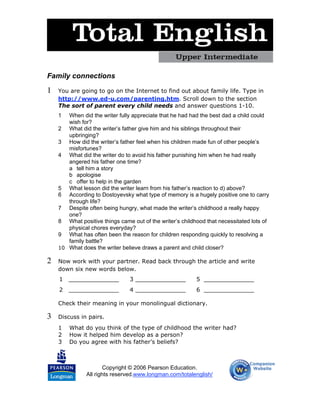Unit 1
- 1. Family connections
1 You are going to go on the Internet to find out about family life. Type in
http://www.ed-u.com/parenting.htm. Scroll down to the section
The sort of parent every child needs and answer questions 1-10.
1 When did the writer fully appreciate that he had had the best dad a child could
wish for?
2 What did the writer’s father give him and his siblings throughout their
upbringing?
3 How did the writer’s father feel when his children made fun of other people’s
misfortunes?
4 What did the writer do to avoid his father punishing him when he had really
angered his father one time?
a tell him a story
b apologise
c offer to help in the garden
5 What lesson did the writer learn from his father’s reaction to d) above?
6 According to Dostoyevsky what type of memory is a hugely positive one to carry
through life?
7 Despite often being hungry, what made the writer’s childhood a really happy
one?
8 What positive things came out of the writer’s childhood that necessitated lots of
physical chores everyday?
9 What has often been the reason for children responding quickly to resolving a
family battle?
10 What does the writer believe draws a parent and child closer?
2 Now work with your partner. Read back through the article and write
down six new words below.
1 ______________ 3 ______________ 5 ______________
2 ______________ 4 ______________ 6 ______________
Check their meaning in your monolingual dictionary.
3 Discuss in pairs.
1 What do you think of the type of childhood the writer had?
2 How it helped him develop as a person?
3 Do you agree with his father’s beliefs?
Copyright © 2006 Pearson Education.
All rights reserved.www.longman.com/totalenglish/
- 2. Family connections
TEACHER’S NOTES:
Aim: to use the Internet to explore the theme of connections. This
webquest is designed to be used in conjunction with unit 1.
Time: 40 minutes
Materials: photocopies of the worksheet for each student
1 Explain to the class that they are going to go on the internet to
look at a website which examines family life - it is one person’s
story reflecting back on their life and experiences as a child and
father. Check that all students are on the correct website. Monitor
as they do the questions to check that everyone is able to find the
answers. Elicit answers from the students.
Answers: (correct at the time of going to press) 1 Later on in his life
when he was agonising over his own teenagers. (para 1) 2 consideration
(para 2) 3 He didn’t think it at all funny and wouldn’t tolerate his children
acting in this way. (para 3) 4 apologise (para 4) 5 by all means chastise
children but as soon as they are truly, sorry forgive them (para 5) 6 a
memory connected with childhood and home (para 6) 7 The fact that his
parents gave the children time and attention on a daily basis, e.g. meals
together (para 7) 8 qualities such as self-discipline, concentration and
perseverance - all vital qualities for being a father oneself (para 8) 9
When parents are humble enough to admit that their expectations may
have been unclear or unfair. (para 10) 10 loyalty (para 11)
2 This is a vocabulary rich article, so students have a chance to note
down six new words. Increase this to ten if appropriate. Ask
students to check their new words in a dictionary. Monitor this
activity to check that students are clear on any differences between
American and British spelling. Elicit students’ answers and
encourage peer correction.
3 Ask students to discuss the three questions in pairs. Ask pairs to
group up with another pair to compare ideas before getting
feedback from the class.
Copyright © 2006 Pearson Education.
All rights reserved.www.longman.com/totalenglish/

